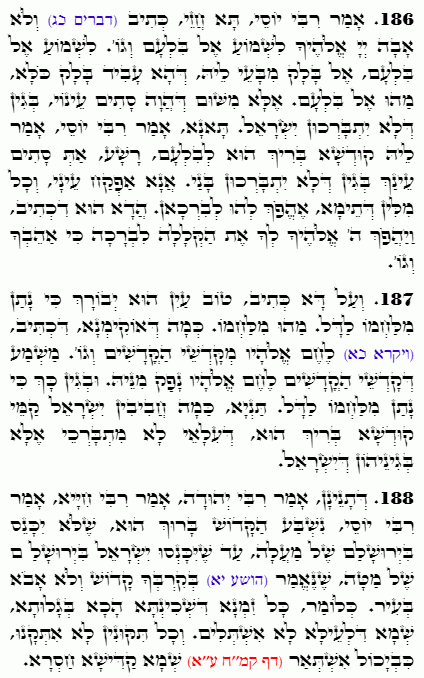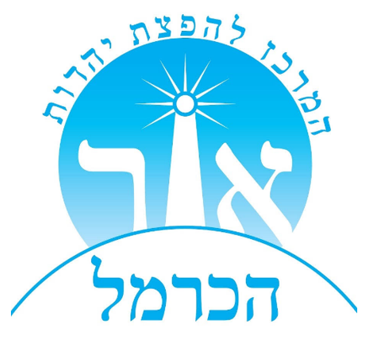Daily Zohar # 4585 – Naso – He will not enter the Jerusalem above until the complete redemption
Daily Zohar 4585

Hebrew translation:
187. וְעַל כֵּן כָּתוּב, (משלי כב) טוֹב עַיִן הוּא יְבֹרָךְ כִּי נָתַן מִלַּחְמוֹ לַדָּל. מַה זֶּה מִלַּחְמוֹ? כְּמוֹ שֶׁבֵּאַרְנוּ, שֶׁכָּתוּב (ויקרא כא) לֶחֶם אֱלֹהָיו מִקָּדְשֵׁי הַקֳּדָשִׁים וְגוֹ’. מַשְׁמָע שֶׁקָּדְשֵׁי הַקֳּדָשִׁים, לֶחֶם אֱלֹהָיו יָצָא מִמֶּנּוּ, וְלָכֵן כִּי נָתַן מִלַּחְמוֹ לַדָּל. לָמַדְנוּ כַּמָּה חֲבִיבִים יִשְׂרָאֵל לִפְנֵי הַקָּדוֹשׁ בָּרוּךְ הוּא, שֶׁעֶלְיוֹנִים וְתַחְתּוֹנִים מִתְבָּרְכִים רַק בִּגְלַל יִשְׂרָאֵל.
188. שֶׁלְּמַדְנוּ, אָמַר רַבִּי יְהוּדָה אָמַר רַבִּי חִיָּיא אָמַר רַבִּי יוֹסֵי, נִשְׁבַּע הַקָּדוֹשׁ בָּרוּךְ הוּא שֶׁלֹּא יִכָּנֵס בִּירוּשָׁלַיִם שֶׁל מַעְלָה עַד שֶׁיִּכָּנְסוּ יִשְׂרָאֵל בִּירוּשָׁלַיִם שֶׁל מַטָּה, שֶׁנֶּאֱמַר (הושע יא) בְּקִרְבְּךָ קָדוֹשׁ וְלֹא אָבוֹא בְּעִיר. כְּלוֹמַר, כָּל זְמַן שֶׁהַשְּׁכִינָה כָּאן בַּגָּלוּת, הַשֵּׁם שֶׁלְּמַעְלָה לֹא נִשְׁתַּלֵּם, וְכָל הַתִּקּוּנִים לֹא נִתְקְנוּ, כִּבְיָכוֹל נִשְׁאָר הַשֵּׁם הַקָּדוֹשׁ חָסֵר.
.
Zohar Naso
Continued from previous DZ
#186
Rabbi Yosi said, “Come and see, it is written,
Deuteronomy 23:6
“וְלֹא אָבָה יְהוָה אֱלֹהֶיךָ לִשְׁמֹעַ אֶל בִּלְעָם וַיַּהֲפֹךְ יְהוָה אֱלֹהֶיךָ לְּךָ אֶת הַקְּלָלָה לִבְרָכָה כִּי אֲהֵבְךָ יְהוָה אֱלֹהֶיךָ.”
“Nevertheless, the LORD your God would not listen to Balaam, but the LORD your God turned the curse into a blessing for you because the LORD your God loves you.”
He asks, why does it say ‘to Balaam’? It should say ‘to Balak,’ for Balak was the one who did everything. What is the meaning of ‘to Balaam’? He answers it is because Balaam closed his eyes so that Israel would not be blessed. We learned that Rabbi Yosi said, the Holy One, Blessed be He, said to Balaam, ‘Wicked one, you closed your eyes so that My children would not be blessed. I will open My eyes, and all the words you say I will turn into blessings.’ As it is written, ‘The Lord your God turned the curse into a blessing for you because the Lord your God loves you’ (Deuteronomy 23:6).”
#187
Therefore, it is written, “He who has a good eye will be blessed, for he gives of his bread to the poor” (Proverbs 22:9). What is “of his bread”? It is as we have explained, as it is written, “לֶחֶם אֱלֹהָיו מִקָּדְשֵׁי הַקֳּדָשִׁים” “The bread of his God, from the most holy things” (Leviticus 21:22). This implies that from the most holy things comes the bread of his God. Therefore, “for he gives of his bread to the poor.” We have learned how beloved Israel is before the Holy One, Blessed be He, as the higher levels are blessed only because of Israel.
Explanation: “Good eye” refers to Yessod. “Poor” (דל) refers to Malchut, which has nothing of its own. Binah is called “the most holy thing.” Therefore, it implies that from the most holy things, which is Binah, the bread of his God, flows out, meaning the sustenance called the bread of his God. Therefore, “he gives of his bread to the poor,” as it is written, “He who has a good eye,” which is Yessod, “gives of his bread,” that is, the sustenance from Binah called the bread of his God, to the poor, which is Malchut.
#188
Rabbi Yehuda said, Rabbi Chiya said in the name of Rabbi Yosi: The Holy One, Blessed be He, swore that He would not enter the Jerusalem above, which represents the complete union of י and ה, Yud, and Heh until Israel enters the Jerusalem below. That is, until the complete redemption, as it is said,
Hosea 11:9
“לֹא אֶעֱשֶׂה חֲרוֹן אַפִּי לֹא אָשׁוּב לְשַׁחֵת אֶפְרָיִם כִּי אֵל אָנֹכִי וְלֹא אִישׁ בְּקִרְבְּךָ קָדוֹשׁ וְלֹא אָבוֹא בְּעִיר.”
“I will not execute the fierceness of My anger; I will not again destroy Ephraim. For I am God, and not man, The Holy One in your midst; And I will not come with terror.”
“The Holy One in your midst” means that the name above is incomplete as long as the Shechina is in exile. As long as all the corrections are not completed, meaning until the final rectification, Tikun, the holy name, so to speak, remains incomplete.
Explanation: There are two unions in Aba and Imma (Father and Mother): an internal union and an external union. The Holy One swore that He would not enter the Jerusalem above, which means the internal union of Yud and Heh, which are Aba and Imma. However, the external union of Aba and Imma continues even during the six thousand years. Regarding the internal union, it is said, “so to speak, the holy name remains incomplete,” but not regarding the external union.
Friday would be a good day to make a ** Donation, especially if you didn’t donate in the past week. Giving on Friday, which is an aspect of Yessod, expands the vessel for the Light and honor of Shabbat.
** Your donation doesn’t have to be given to the same place every week. You can alternate or split your donation among those who benefit you spiritually.
 Support – Ohr HaCarmel Yeshiva
Support – Ohr HaCarmel Yeshiva
Tap here: Ohr HaCarmel Donation Page to make your contribution and make a spiritual connection to Israel.
The Yeshiva Ohr HaCarmel (which means the Light of the Carmel) is on top of Mount Carmel, where the prophet Elijah’s prayers were answered.

 Previous: Naso
Previous: Naso

